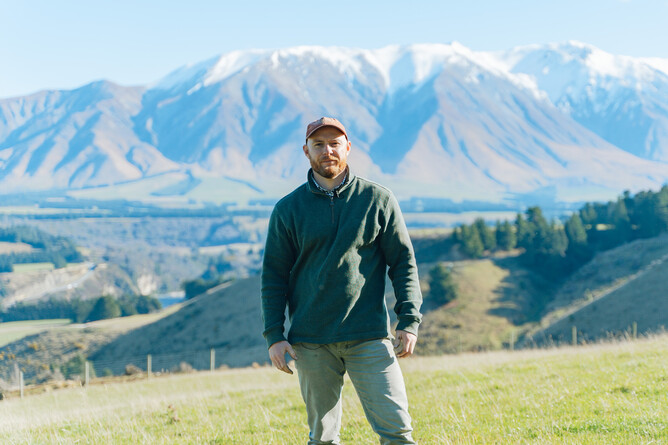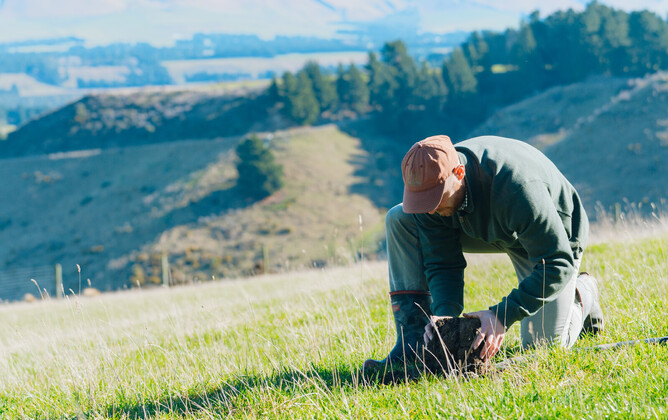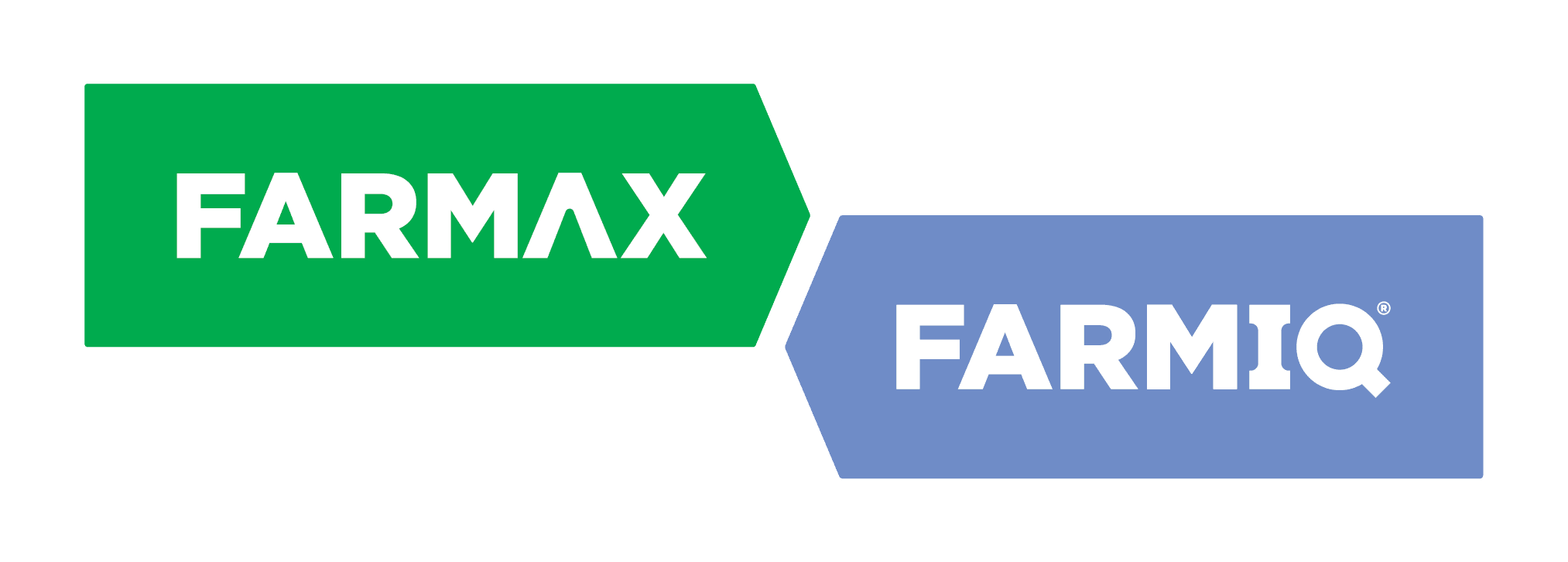“I left high school thinking I didn't want be a farmer and then now I want to be a farmer,” Conan laughs. “I've kind of made my way back to agriculture through the environmental space and then now with my own consultancy, which I've been doing for about 18 months now. I went a different route.”
Conan Moynihan grew up on a family sheep and beef farm in a small town called Cave in South Canterbury. He ran the farm alongside his parents during and after university, and while he had the chance to take over succession, he didn’t see how at 25 years old he would be able to provide his parents with the retirement they deserved, pay out his siblings and take on millions of dollars of debt.
After exploring different areas, he found his way back to agriculture through the environmental space and then set up his own farm consultancy business, Force of Nature Consulting, in Central Canterbury, which he’s been running for about 18 months.
“I really enjoyed all the environmental stuff like geography, geology, sciences – how everything fits together in that chaos. I saw water was going to be a big issue in the future, so I was quite interested in that,” explains Conan.
Conan’s consulting focuses on three areas of farm businesses: a big-picture business strategy, environmental compliance and irrigation testing, and he works with dairy, sheep and beef farmers, as well as a few cropping farmers.
“I personally feel like sustainability is a buzzword. What we really want to do is be regenerating our soils and our landscapes, because that means the next generation can farm and be profitable too. While a lot of my stuff has environmental sustainability links, it actually directly links to profitability; what's good for the environment is actually really good for the bank account.”
Conan asserts that farms need to be profitable first and once the finances are solid, farmers will have the leeway and the means to optimise the farm in terms of environmental footprint, succession and production.
“I generally use [FARMAX] models as a guide – this is what I think will happen, this is what the model says – that's there to help back your decision making on farm. Farmers want to see the data, they want to see the dollars, so if you show them that something's good for the environment and good for their back pocket, they'll pull trigger on that pretty quick,” asserts Conan.
"While a lot of my stuff has environmental sustainability links, it actually directly links to profitability; what's good for the environment is actually really good for the bank account."
Hard times and hard truths
Balancing financials with environmental measures are just two balls that farmers are juggling during what Conan agrees is a weird time for farmers, as they are almost stuck in a transition period between the previous and incoming government where no policies or visions have been outlined.
“The feedback I'm getting from farmers is it’s just frustrating. They just want to be able to keep moving forward and know that if they're doing projects at the moment, it's not going to be for nothing if something gets repealed in three years if the government changes.
“The end result must be an amalgamation and utilisation of a lot of the processes that are already there. Hopefully we can use the core of those so there's no duplication,” says Conan.
Part of the issue is the historic trend of companies and organisations keeping farm data separate, making farmers enter the same information over and over again. Conan sees progress here though, noting that companies are getting a lot better at sharing data.
“Farmers hate this duplication. There just seems to be more and more certifications and audits coming down the line.
“Can't we just have one [regulatory] person go to the farm each year and do all the audits and then it frees the farmer’s time up to work on things such as FARMAX and do that work on the business,” he says.
Governments flip-flopping on rules and regulations is also no help to farmers, and Conan believes it may actually be moving our industry backwards.
“Emissions are being pushed by overseas companies, which we have no say on. So, while we flip flop here, environmentally we go backwards, farmers go backwards.
“We’re telling all our farmers that we are the best in the world while we're actually slipping further and further behind – some of our top researchers think we're out of the top ten in terms of grazing management. Then you hear Beef + Lamb NZ or DairyNZ say ‘no, you're number one in the world, you're the most efficient.’ We are slipping because we just want to pat everyone on the back and not have hard conversations,” Conan stresses.
Conan has heard from farmers about their hesitation in having to follow the stipulations of overseas markets, but what he’s more interested in are the opportunities and incentives that farmers have available to them:
“If they've got the data and they can get the ducks lined up, they're going to crush it. And if you're doing stuff that's good for the environment, good for soil carbon, good for waterways, protecting yourself against a changing climate, you’re actually going to be more productive in some cases.
“It all works towards you being better and more profitable in the long run…it's all opportunity. What we should be doing is increasing efficiency and focusing on profitability and getting more money back to [farmers] and selling our story about why we're so carbon efficient. If emissions is the game, let's play the game and let's get the money.”
People power
Being exposed to the right people can make all the difference in the lives and career trajectories of farmers, says Conan, with good bosses instilling positive habits and knowledge.
“If you went farming for someone who's really, really good at what they do, you'll pick that up inherently. But if you've got bad bosses who are bad at managing people or at farming, that sentiment becomes yours, that's what you learn.
“There's no real silver bullet. It's just about surrounding yourself with really good people and good mentors, no matter where you are in your farming journey.”
Continuing education is something that Conan is passionate about – Conan himself gets coaching on mindset, personal and professional development, and says it’s the best investment he has ever made. He knows how beneficial it can be for farmers too, not only in terms of running a farm business but to nurture their own interests and hobbies, create like-minded networks and build a good work-life balance.
“Something a lot of farmers could benefit from is getting a mentor, someone to show them the path forward. Those leading guys who have built their way up through the ranks, they initially go talk to someone who's done it before them to see how. Everyone's really happy to share and help someone get a leg up – that’s a great thing about New Zealand,” smiles Conan.
Conan is excited about the opportunities ripe for Kiwi farmers and the vast potential that can be achieved when people see life through a different lens.
“I just see untapped potential in the people and the landscapes that we work with, so if we can get people to see that in themselves, then I think a lot of our issues like profitability, environmental management and wider community issues can be improved,” says Conan.
"What we should be doing is...selling our story about why we're so carbon efficient. If emissions is the game, let's play the game and let's get the money."
Embracing technology
Technology is definitely an area that Conan believes more farmers should also embrace, not only for the traceability and knowledge it can provide, but because of the financial benefits.
“It's almost becoming hard not to have adoption if you want to be a leading farmer – you have to use technology to be profitable. If we think about all the environmental compliance, auditing, all that stuff, it's so much easier to have it online than pieces of paper and trying to figure out where it all is,” he says.
Additionally, ag tech can save time and add value to the farm business.
“Doing manual recording and paperwork is time that could be spent actually working on their business. They could be running some FARMAX models to explore changes to a farm system, but instead they’re just filling out where their fertiliser went. There’s a phenomenal amount of paperwork that goes into it now, and some guys are spending a day a week in the office doing paperwork. That's not what they signed up for,” says Conan.
Looking to the future
Kiwi farmers have great stories to tell about their land and produce, and Conan thinks that should be embraced and capitalised on more.
“[There’s a] lack of clear unity and vision for New Zealand agriculture for the next 10-15 years. The Minister of Ag isn’t going, ‘this is what we're doing, this is what we're working towards, and this is what it means for you, the farm, your back pocket and the wider rural communities.’
“That's something that people could get behind, and that's where we lack leadership. The government says you’re the best in the world and we’re going to double exports. No idea how we’re going to do it based on a number of factors, but it’s a good sound bite, isn’t it?”, he says.
There’s no concrete certainty in farming due to so many external factors coming into play, so it’s no wonder that farmers are looking for some reassurance that what they are doing is the right thing, says Conan.
Testing scenarios and exploring farm changes in FARMAX can help paint a picture of the future.
“You can show them a FARMAX model and be like, hey this is what we talked about, this is potentially what it would look like in an average year and that's the confirmation they actually might need to try something different. They see their potential ideas can be realised.”
And what does the future look like for Conan? It’s busy, that’s for sure. As well as running Force of Nature and embarking on personal development programmes, Conan is creating a growing presence on social media, sharing his consulting knowledge, showing young people the different rural sector pathways, and sharing his own story. The ultimate goal is to own his own farm down the track.
Conan mentions that it takes 28 pieces of online content for someone to trust you, so he’s working to provide interesting, informative and honest advice and ideas to encourage farmers to get engaged and see things from a different perspective.
“I want to share a message that is true to me and try to be as authentic as I can. One of my main values as a person is authenticity and I want to bring that to my life so that I can encourage farmers to be authentically themselves and not just fit into the crowd. I'm hoping that it will soon encourage other people, particularly farmers, to share their journeys as well.”
You can check out Conan on Instagram: forceofnaturenz, visit his website www.forceofnatureconsulting.com or listen to his podcast The Force of Nature Podcast.


